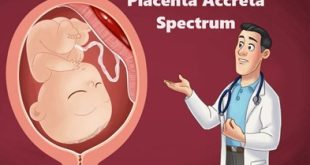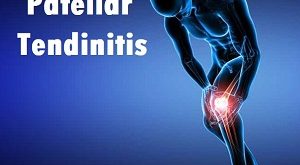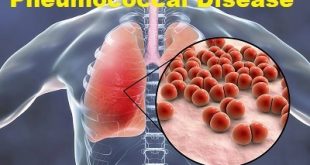Definition
Polycystic ovary syndrome (PCOS) is a condition in which a woman’s levels of the sex hormones estrogen and progesterone are out of balance. This leads to the growth of ovarian cysts (benign masses on the ovaries). PCOS can affect a women’s menstrual cycle, fertility, cardiac function, and appearance.
Polycystic ovary
History
The condition was first described in 1935 by American gynecologists Irving F. Stein, Sr. and Michael L. Leventhal, from whom its original name of Stein–Leventhal syndrome is taken. The earliest published description of a person with what is now recognized as PCOS was in 1721 in Italy. Cyst-related changes to the ovaries were described in 1844
Epidemiology
In the United States, polycystic ovarian syndrome (PCOS) is one of the most common endocrine disorders of reproductive-age women, with a prevalence of 4-12%. Up to 10% of women are diagnosed with PCOS during gynecologic visits. In some European studies, the prevalence of PCOS has been reported to be 6.5-8%.
A great deal of ethnic variability in hirsutism is observed. For example, Asian (East and Southeast Asia) women have less hirsutism than white women given the same serum androgen values. In a study that assessed hirsutism in southern Chinese women, investigators found a prevalence of 10.5%. In hirsute women, there was a significant increase in the incidence of acne, menstrual irregularities, polycystic ovaries, and acanthosis nigricans.
PCOS affects premenopausal women, and the age of onset is most often perimenarchal (before bone age reaches 16 years). However, clinical recognition of the syndrome may be delayed by failure of the patient to become concerned by irregular menses, hirsutism, or other symptoms or by the overlap of PCOS findings with normal physiologic maturation during the 2 years after menarche. In lean women with a genetic predisposition to PCOS, the syndrome may be unmasked when they subsequently gain weight.
Types of polycystic ovary syndrome
1) Insulin-Resistant PCOS
This is the classic type of PCOS and by far the most common. High insulin and leptin impede ovulation and stimulate the ovaries to make testosterone. Insulin resistance is caused by sugar, smoking, trans fat, and environmental toxins.
2) Pill-Induced PCOS or Post-Pill PCOS
Hormonal birth control suppresses ovulation. For most women, it’s a temporary effect, and ovulation will usually resume fairly soon after the Pill is stopped. But for some women, ovulation-suppression can persist for months or even years. During that time, it is not unusual to be given the diagnosis of PCOS. Some experts deny the existence of Pill-induced PCOS, but it is very real. It is the second most common type of PCOS.
3) Inflammatory PCOS
Inflammation or chronic immune activation results from by stress, environmental toxins, intestinal permeability and inflammatory foods like gluten or A1 casein. Inflammation is a problem for PCOS because it impedes ovulation, disrupts hormone receptors, and stimulates adrenal androgens such DHEA and androstenedione.
4) Hidden-Cause PCOS
This is the ‘simpler-than-you-think’ type of PCOS. There is one simple thing that is blocking ovulation. Once that single thing is addressed, this type of PCOS resolves very quickly, usually within 3-4 months. Common hidden causes of PCOS include:
- Too much soy, because it is anti-estrogen and can block ovulation in some women. (A small amount is okay.)
- Thyroid disease, because your ovaries need T3 thyroid hormone.
- Vegetarian diet, because it causes zinc deficiency, and your ovaries need zinc.
- Iodine deficiency, because your ovaries need iodine. Please be careful with iodine supplementation. Read my iodine post.
- Artificial sweeteners, because they impair insulin and leptin signaling.
- Too little starch in your diet, because your hormonal system needs Gentle Carbs.
Risk factors of polycystic ovary syndrome
Having PCOS can increase your chances of developing other health problems in later life. For example, women with PCOS are at increased risk of developing:
Type 2 diabetes: A lifelong condition that causes a person’s blood sugar level to become too high
Depression and mood swings: Because the symptoms of PCOS can affect your confidence and self-esteem
High blood pressure and high cholesterol: This can lead to heart disease and stroke
Sleep apnoea: overweight women may also develop sleep apnoea, a condition that causes interrupted breathing during sleep
Women who have had absent or very irregular periods (fewer than three or four periods a year) for many years have a higher-than-average risk of developing cancer of the womb lining (endometrial cancer).
However, the chance of getting endometrial cancer is still small and can be minimised using treatments to regulate periods, such as the contraceptive pill or an intrauterine system (IUS).
Causes
The exact cause of PCOS is not known. Most experts think that several factors, including genetics, play a role:
High levels of androgens: Higher than normal androgen levels in women can prevent the ovaries from releasing an egg (ovulation) during each menstrual cycle, and can cause extra hair growth and acne.
High levels of insulin: Insulin is a hormone that controls how the food you eat is changed into
energy. Insulin resistance is when the body’s cells do not respond normally to insulin. As a result, your insulin blood levels become higher than normal. Many women with PCOS have insulin resistance, especially those who are overweight or obese, have unhealthy eating habits, do not get enough physical activity, and have a family history of diabetes (usually type 2 diabetes). Over time, insulin resistance can lead to type 2 diabetes.
Symptoms of polycystic ovary syndrome
Some of the symptoms of PCOS include:
- Irregular menstrual cycle. Women with PCOS may miss periods or have fewer periods (fewer than eight in a year). Or, their periods may come every 21 days or more often. Some women with PCOS stop having menstrual periods.
- Too much hair on the face, chin, or parts of the body where men usually have hair. This is called “hirsutism.” Hirsutism affects up to 70 percent of women with PCOS.
- Acne on the face, chest, and upper back
- Thinning hair or hair loss on the scalp; malepattern baldness
- Weight gain or difficulty losing weight
- Darkening of skin, particularly along neck creases, in the groin, and underneath breasts
- Skin tags, which are small flaps of excess skin in the armpits or neck area
What are the potential complications of PCOS?
Women with PCOS have a higher risk of developing:
- Infertility
- Hypertension (high blood pressure)
- High cholesterol
- Anxiety and depression
- Sleep apnea
- Endometrial cancer
- Heart attack
- Diabetes
- Breast cancer
If you become pregnant, your doctor may refer you to a doctor who specializes in high-risk pregnancies. Women with PCOS have a higher rate of miscarriage, gestational diabetes, and premature delivery. They may need extra monitoring during pregnancy.
The earlier your PCOS is diagnosed and treated, the lower your risk of developing these complications. Avoiding tobacco products and participating in regular exercise can also reduce your risk of some of these comorbidities. Talk with your doctor about what PCOS means for your overall health and how you can prevent serious complications.
Diagnosis and test
There’s no test to definitively diagnose PCOS. Your doctor is likely to start with a discussion of your medical history, including your menstrual periods and weight changes. A physical exam will include checking for signs of excess hair growth, insulin resistance and acne.
Your doctor might then recommend:
A pelvic exam: The doctor visually and manually inspects your reproductive organs for masses, growths or other abnormalities.
Blood tests: Your blood may be analyzed to measure hormone levels. This testing can exclude possible causes of menstrual abnormalities or androgen excess that mimics PCOS. You might have additional blood testing to measure glucose tolerance and fasting cholesterol and triglyceride levels.
An ultrasound: Your doctor checks the appearance of your ovaries and the thickness of the lining of your uterus. A wandlike device (transducer) is placed in your vagina (transvaginal ultrasound). The transducer emits sound waves that are translated into images on a computer screen.
If you have a diagnosis of PCOS, your doctor might recommend additional tests for complications. Those tests can include:
- Periodic checks of blood pressure, glucose tolerance, and cholesterol and triglyceride levels
- Screening for depression and anxiety
- Screening for obstructive sleep apnea
Treatment and medications
PCOS can be treated, but there is no cure. Treatment focuses on controlling symptoms and managing the condition to prevent complications. The treatment will vary from woman to woman, depending on specific symptoms. Tips for controlling symptoms may include:
Eat a healthy diet: A healthy diet and regular exercise is recommended for all women with PCOS, particularly those who are overweight. This can help to regulate your menstrual cycle and lower your blood glucose levels.
Take birth control pills if you aren’t planning to become pregnant: Women who don’t want to become pregnant may be prescribed birth control pills. These can help treat acne, regulate the menstrual cycle, and lower levels of male hormones, such as testosterone, in the body. If a woman with PCOS is infertile, fertility drugs may be prescribed to aid in ovulation.
Ask your doctor about medications that may help you: Anti-androgens are drugs that reduce male hormone levels. These can help stop excess hair growth and reduce acne. Diabetes medications may also be prescribed to lower blood glucose and testosterone levels.
Surgery: Surgery may be recommended for some women with PCOS. Ovarian drilling is a procedure in which your doctor punctures your ovary with a small needle that carries an electric current. This is done in order to destroy part of the ovary. It’s a short-term solution that can promote ovulation and reduce male hormone levels.
Prevention of polycystic ovary syndrome
Polycystic ovary syndrome (PCOS) cannot be prevented. But early diagnosis and treatment helps prevent long-term complications, such as infertility, metabolic syndrome, obesity, diabetes, and heart disease.
 Diseases Treatments Dictionary This is complete solution to read all diseases treatments Which covers Prevention, Causes, Symptoms, Medical Terms, Drugs, Prescription, Natural Remedies with cures and Treatments. Most of the common diseases were listed in names, split with categories.
Diseases Treatments Dictionary This is complete solution to read all diseases treatments Which covers Prevention, Causes, Symptoms, Medical Terms, Drugs, Prescription, Natural Remedies with cures and Treatments. Most of the common diseases were listed in names, split with categories.








please what type of food should be taken to avoid this
Foods to be taken to avoid PCOS:
cruciferous vegetables, such as broccoli, cauliflower, and Brussels sprouts
greens, including red leaf lettuce and arugula
green and red peppers
beans and lentils
almonds
berries
sweet potatoes
winter squash
pumpkin
Refined carbohydrates cause inflammation, exacerbate insulin resistance, and should be avoided. These include highly processed foods, such as:
white bread
muffins
breakfast pastries
sugary desserts
white potatoes
anything made with white flour
can i get pregnant if I have polycystic ovary
Yes you can get pregnant with this syndrome. but medications should be taken to reduce risks during pregnancy.
Hello Dr! I lost my period 3months now but sometime i see brown blood not much, what is d problem?
consult gynecologist.
i lose my period for now 5 month what treatment can i
use to get it normal
i want to get pregnant what can i use i am trying but i cant what may be wrong
Please consult a good gynecologist.
i loz my period for 5 month now help me please to get normal i want to get pregnant but i can not
I had pro longed periods 8yrs ago….since then I cant be pregnant ??what could be wrong ??
consult gynecologist.
how long one can take metformin in PCOD? Is it necessary to continue metformin if one gets pregnant?
Yes it can be continued during pregnancy but before taking you should consult doctor to take metformin based on health condition during pregnancy.
I am on primolut N 5mg…. if I don’t take this drug, I don’t get my period. should I continue to take this and pls can I get pregnant while on this drug?
Please consult a doctor to reduce serious effects in future.
evening Doc, my wife try to see doc but find it difficult especially uch Ibadan Nigeria more than 3-4times so we lost hope in seeing doc. we do it in our own way (prayers) and we believe in Jesus.
I’m 19 years old medical student And facing skiped menstrual cycle and get my periods after 2 months even I had been taking pills after complete medication Again this problem. I’m badly worried? about it Please guide me how to get my regular periods and prescribe me diet too
please consult a gynecologist to get rid of this problem.
Hi doctor I’m a 29yrs old lady I dnt see my periods at all n I saw a gynecology early this year because I want a child and he told me that I have a premature ovarian failureand he ddnt prescribed anything for me help me please me.
Please consult a gynecologist as soon as possible.
hi doctor help me I want a child and I don’t see my periods and my gynecology told me that I have a premature ovarian failure
Take appropriate measures with the help of a gynaecologist as soon as possible.
what should I do to clear my ovarian cyst
Please consult a doctor for better results.
my cyst have failed to clear I don’t know what to do
Please consult a doctor as soon as possible.
can you send me medication. no one can treat my pcos… they properly didn’t knw. how to treat pcos patients…
Please consult a specialist in PCOS.
What can I do or use to clear my ovarian cyst? I want to conceive, pls help.
please consult a doctor.
Salam doctor! ….me is sufferrd in PCOS for last 3 years . A large number of hair on my face like man.I cured different doctors but not get positive result .my age is 18 years and I am medical student . I am really worried about this . now I am taking” Dain 35″ tables. is it good for me? please suggest me to get rid from this disease.
Please consult a doctor to get rid of this problem.
Ello doctor, I always have pain at my left side of stomach, after done one operation. especially during period time. then I go back to my doctor, to complain. he told me that am having re occurre cyst which
pcos. pls doctor how can I treat
this again, am fed up. still looking for a baby. am 35yrs old now.
drugs to treat polycystic ovaries
Clomiphene, Eflornithine, Metformin are the most commonly used drugs to treat polycystic ovaries, But before takes this medication please consult a doctor to get the proper medication for the disease.
hello doctor i have ovarian cycle n i did the surgery on it since 2012 as am talking to you now it has grown back again n i went to a doctor who specialist n iseveral test n after much test he mention typhoid, hormonal balances n he gave some pill combination 3 n all other drugs which after much my menses flow but it can’t flow without me taking the pill n they said i have infection which he gave me the infection as well but as am speaking with now for over three month it has not come out
Please consult a gynecologist to get rid of this problem. Hope you will get well soon.
doctor I have been digonised with cyst two weeks ago and I was given birth control pills to take for one month but up to now I have not gain back my period what is wrong and will I really get pregnant.
Please consult a gynecologist.
Im pcod. my period is reggular but the problem is bleeding up to 9 or 10 days can i conceive im waiting for children
Please consult a gynecologist to cure this problem.
what foods to eat to prevent this?
Foods to add to prevent PCOS:
High-fiber vegetables, such as broccoli
lean protein, such as fish
anti-inflammatory foods and spices, such as turmeric and tomatoes
Hello everyone consume flax seed per day during 3 month early in the morning and when you consume don’t eat anything else for 2 hours and you should avoid chicken and sugar contain products. I am dietician so apply in your daily routine and see the results hope you will see results soon.. JazakAllah khair
Thank you for suggesting a diet for polycystic ovary, keep supporting our app.
my wife is having pcos can she get pregnant
once the PCOS has been treated she can conceive. We recommend you to contact a gynecologist for proper treatment.
am 17yrs …I have been having skipped periods for over 3 yes now ..since I started my periods but wen I get them ….I take long to stop bleeding …at times I bleed for abt 3to 4?? months ..and I have to get a blood transfusion …lately I was diagnosed of pcos ..wat medicine should I take ..pliz any advice is helpful pliz. ….thank you ?